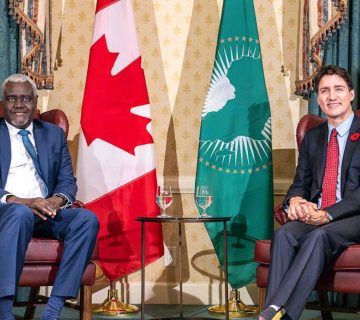Kenya’s support for Somalia’s security and stabilization efforts cannot be gainsaid; no other country has given blood and sweat for Somalia than Kenya over the past three decades. The acute insecurity and political instability that have created one of the world’s most protracted conflict and humanitarian situations have also displaced 2.6 million Somalis internally and more than 750,000 of them externally, according to the United Nations’ refugee agency, UNHCR. Most of these externally displaced Somalis live in three Dadaab refugee camps in Kenya. An unspecified number that has migrated to Kenya as a result of related insecurity and destitution live in different locations in Kenya. Additionally, for almost a decade, Kenya has been contributing troops to African Union’s peacekeeping and stabilization mission, AMISOM. Considering Kenya’s financial, military, and logistical investment in Somalia so far, and the implications that the outcome of Somalia’s upcoming national elections could have on regional peace, security, and stability, it is in Kenya’s interest to remain seized on ongoing developments in Somalia. It is also in the interest of Somalia and Somalis – including those in the Somalia diaspora, to maintain good relations with Kenya, Ethiopia, and other countries in the region, regardless of the poll outcome, for Somalia’s post-poll progress, and regional peace and security.
Matters of Mutual National Interest
There are three main interrelated reasons why Somalia’s stability during and after the upcoming national poll is a matter of Kenya’s national interest. First, even as Kenya continues to bear the logistical, financial, and security burdens of hosting thousands of Somali nationals in and outside refugee camps, and supporting AMISOM, Kenya continues to receive unfavorable public diplomacy in Somalia. Villa Somalia has not done much in recent years to publicly recognize Kenya’s continued support in the said areas to the fragile Horn of Africa state. To host displaced Somalia nationals for extended periods, for example, Kenya has had to give up and designate some land to settle them, and fund social amenities such as schools, health centers, and police patrols and posts. Additionally, Kenyans make individual monetary and non-monetary contributions to bolster UNCHR’s pro-refugee’ LuQuLuQu campaign that, according to UNHCR, “supports the refugee cause.” Kenya has also provided experienced and well-trained men and women in boots to boost the Somali National Army’s capacity to secure the fragile Horn of Africa state. Some of these have been injured or killed in the process, to their families’ and Kenya’s disadvantage. And that is before mention is made of the hundreds of lives and thousands of US dollars in livelihoods that have been lost in Kenya as a result of attacks by Somalia-based Islamist militant group, al Shabab. This leads to the second reason, al Shabab.
It is an open secret that al Shabab occupies and governs significant territory in Somalia – the group is more present in some parts of the country than the Federal Government of Somalia (FGS). Since August 2020, al Shabab has increased the frequency of attacks, carrying out more than 10 deadly attacks in mid-September alone. This is ostensibly to communicate its displeasure with the potential election of leaders with ‘Western’ affiliations in the upcoming poll. Without joint AMISOM-US military troops’ efforts, or a “successor operation” (Caplan, 2012), al Shabab will likely overrun Somalia and extend its offensive against Somalia’s archrival ‘occupier’ troop-contributor, Kenya. Somalia’s President Mohamed ‘Farmajo’s’ recent plea to the US against US troop withdrawal ahead of the 2020 US’s presidential polls underscores the importance of the peace-stabilizing security mission to Somalia. Kenya, which al Shabab has attacked comparatively more than it has other AMISOM countries, can ill afford an outcome that would render useless any meaningful gains that AMISOM and Somalia’s development partners have achieved since the start of AMISOM’s mandate in February 2007. Neither should a progressive Somalia, bearing in mind that Somalia, according to Mahboub Maalim, immediate former Executive Secretary of Intergovernmental Authority on Development (IGAD), “has been in a state of stagnation for the last four years.”
The third reason is AMISOM’s impending exit after the national poll. Amid concerns that this “designated timetable” (Caplan, 2012) exit strategy will create a security vacuum that al Shabab would readily fill, AMISOM could likely be replaced by a ‘successor operation.’ While the composition and workings of a new operation remain opaque, there are indications that it could be a UN outfit. In August 2020, for example, UN’s top security organ, UNSC, renewed UN Mission in Somalia’s (UNSOM) mandate to offer peace- and state-building advice to FGS and AMISOM for another year (until August 31, 2021). Although only time can tell, the likelihood that UNSOM’s mandate could be expanded in 2021 to include peace stabilization cannot be completely ruled out. Some AMISOM troops, depending on the position adopted by AMISOM troop-contributing countries following AMISOM’s planned exit, for example, could be absorbed into UNSOM for faster mission operationalization.
Towards a More Stable Somalia
Given Kenya’s contributions to Somalia’s peace, security, and humanitarian efforts, Somalia and Kenya could continue working together to their mutual benefit. Having made strides towards free, transparent, and all-inclusive elections, for example, Somalia could leverage Kenya’s governance and judicial institutions to build its institutions. The two countries could undertake joint knowledge transfer programs at Kenya’s School of Government, or local universities and colleges. This could involve Somalia government officials’ trainings in Kenya, and the timed deployment of Kenyan educators in Somalia. This will improve Nairobi-Mogadishu relations and help Somalia make the much-desired shift from its humanitarian phase to a development one. The two could also support each other’s ongoing in-country and cross-border security efforts more, now and after the polls. These will help to change negative anti-state rhetoric; keep al Shabab in check; bolster development partners’ efforts; deliver Somalia from the annals of fragile statehood faster; and maintain security in the Horn of Africa.
Roselyne Omondi is the Associate Director, Research, at the HORN Institute.



